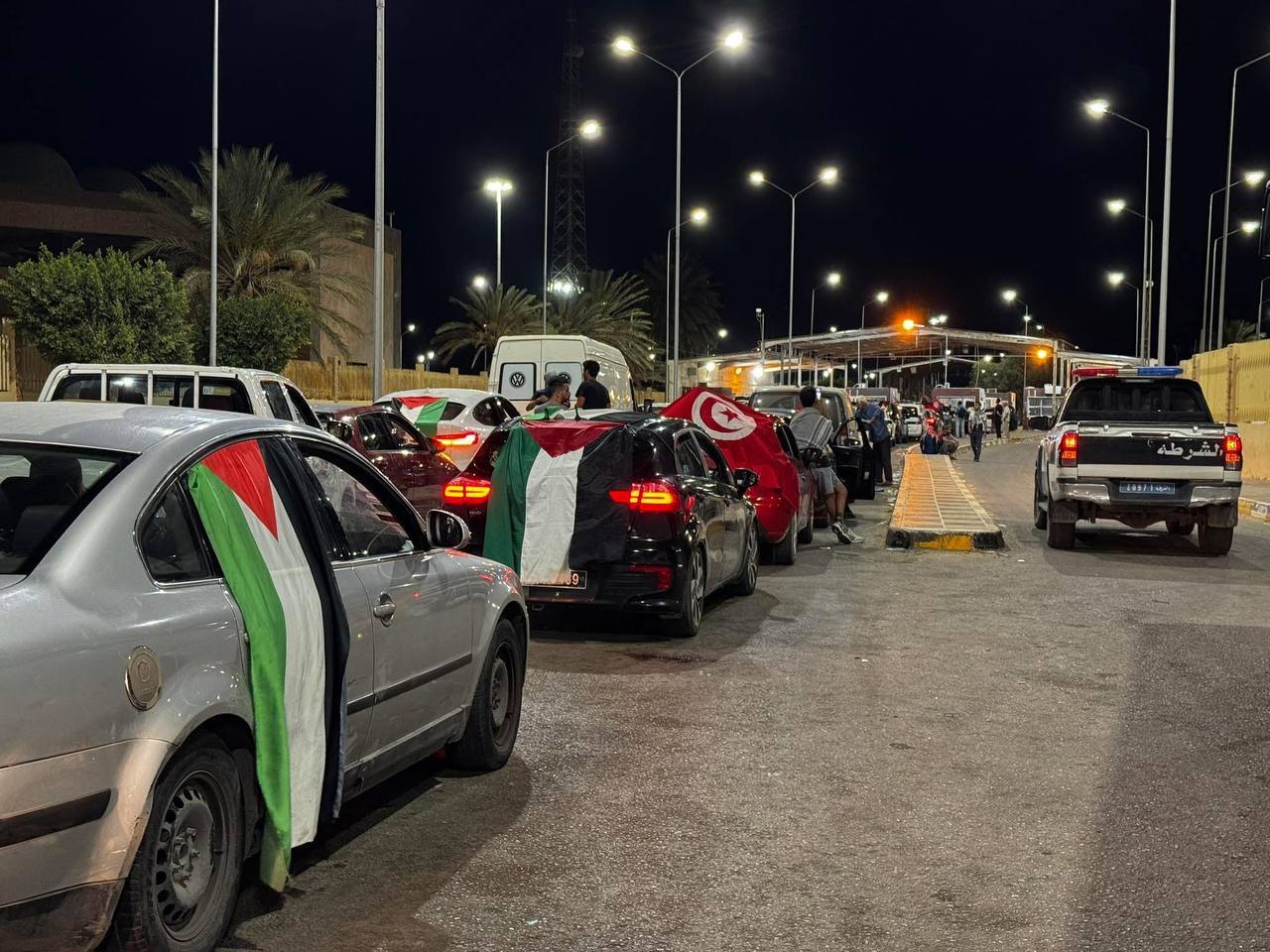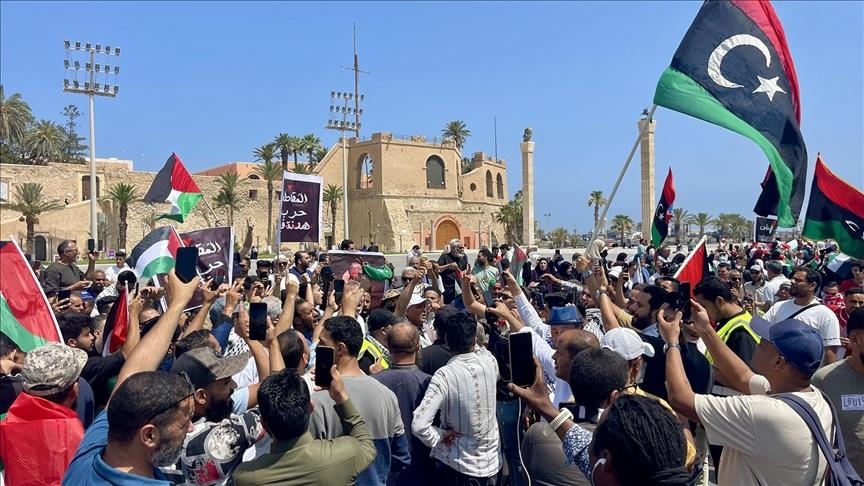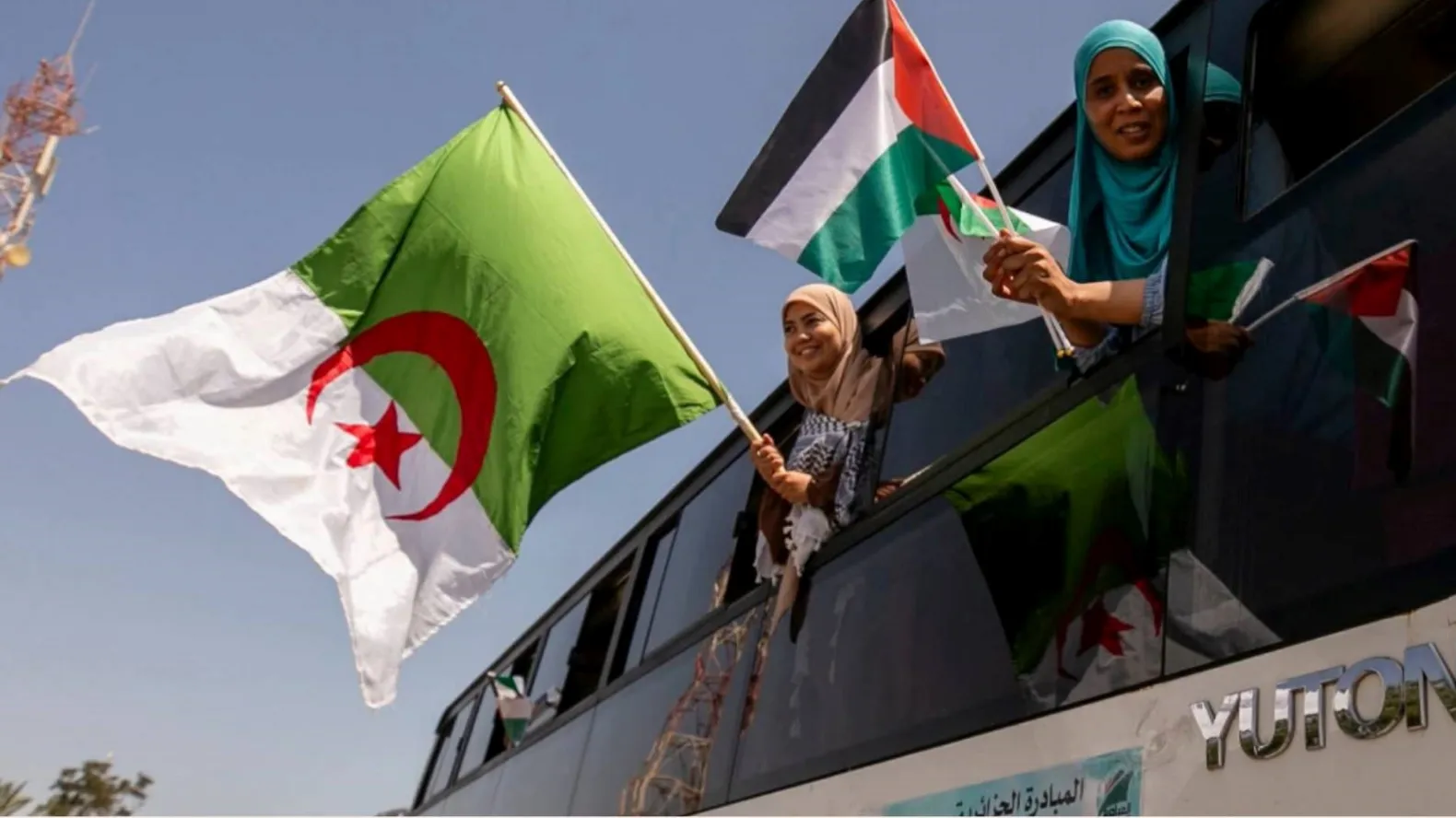Deliberate Blockade: Maghreb Honors Resilience Convoy Amid Sharp Criticism of el-Sisi’s Egypt

The grassroots movement putting pressure on Egypt is completely justified.
Amid widespread public praise and support from citizens across the five Maghreb countries, the symbolic Maghreb Resilience Convoy (Sumud) set off on June 9, 2025, from the Tunisian capital in a bold bid to break the blockade on Gaza.
The initiative, rooted in grassroots solidarity, has stirred significant regional attention — particularly in light of the roadblocks imposed by the Egyptian regime, which effectively prevented the convoy from reaching its destination.
Critics argue these actions serve Israeli interests. Further obstacles reportedly came from authorities in eastern Libya, compounding the difficulties faced by the humanitarian effort.
Ethical Duty
Hundreds of activists from across the Maghreb — Tunisia, Libya, Algeria, Mauritania, and Morocco — are taking part in the convoy, marking a sweeping show of regional solidarity.
According to Tunisia’s “Coordination for Joint Action for Palestine,” the number of participants has surpassed 7,000.
Traveling overland through the desert, the convoy is making its way toward the Egyptian border in an ambitious attempt to reach Gaza via the Rafah crossing.
The initiative stands out as one of the most significant acts of Maghreb solidarity with Palestine in recent years, particularly following the collapse of earlier efforts that had aimed to reach Gaza by sea.
“Participation in this initiative is a human, moral, and Islamic duty,” affirmed Mohamed Vall Cheikh, a member of the Mauritanian delegation taking part in the Maghreb Resilience Convoy to break the siege on Gaza, in a Facebook post published on June 11.
Cheikh described the convoy as a modest effort in the face of the immense suffering endured by our brothers, who are subjected to a brutal war the likes of which history has rarely witnessed — a war that has shown no regard for law or custom, and in which every conceivable atrocity has been committed: systematic killing, displacement, and starvation.
He concluded with a prayer, calling on God to grant success to this blessed convoy in breaking the cruel and unjust blockade, and to bring relief to our brothers standing firm in Asqalan, in al-Quds, and in the surrounding areas. Indeed, He is the All-Hearing, the One who answers prayers.
With unwavering backing from the United States, “Israel” has, since October 7, 2023, carried out what many have described as acts of genocide in Gaza, leaving more than 182,000 Palestinians dead or wounded — the majority of them women and children.
Over 11,000 remain missing, while hundreds of thousands have been displaced amid the relentless assault.

Official Response
One of the most notable official responses to the convoy came from Libya, where Prime Minister of the Government of National Unity, Abdulhamid AlDabaiba, praised the popular reception of the Resilience Convoy (Sumud) after it crossed into Libya from Tunisia.
According to Libya’s Al-Wasat news outlet on June 11, AlDabaiba said, “I am proud and honored by the sons of my people who welcomed and stood alongside the Resilience Convoy — this fraternal humanitarian initiative that set off from Algeria, passed through Tunisia, and reached our country, as Libyans once again set an example in generosity, solidarity, and loyalty, carrying messages of support to the people of Gaza in the face of siege and aggression.”
“It is a noble scene — one not unfamiliar to the people of Libya. It is a continuation of a long history of actions that precede words, and a reaffirmation of the lofty values that bind our peoples together, despite all the crises,” Aldabaiba added.
The capital, Tripoli, welcomed the Resilience Convoy with crowds of citizens waving Libyan and Palestinian flags. Many gathered in Martyrs’ Square, awaiting the arrival of the buses taking part in the convoy.
On June 10, the Resilience Convoy crossed the Ras Ajdir border crossing, met with an enthusiastic official and popular reception in several western Libyan cities along its route, including Zuwara, Zaltan, Sabratah, and Zawiya.
By contrast, on June 13, security forces affiliated with the eastern Libyan authorities halted the Gaza-bound convoy at the entrance to the city of Sirte, citing the need to await security clearance.
The Joint Action Coordination for Gaza said in a statement that “security and military forces affiliated with the eastern Libyan authorities stopped the convoy at the entrance to the city of Sirte, with officials citing the need to await approval instructions from Benghazi before allowing passage.”
In response to this development, the convoy’s organizing committee decided to halt by the roadside and, if necessary, camp on the outskirts of Sirte until the situation becomes clearer.
The statement reassured the families of those involved that all members of the convoy are safe.
The convoy called on the authorities in Benghazi to “live up to their welcoming stance towards the initiative, as expressed in the Libyan Foreign Ministry’s statement,” emphasizing that “the Libyan people make no distinction between east and west when it comes to embracing efforts to support Gaza.”
The coordination committee also appealed to all relevant parties to intervene and facilitate the convoy’s mission, stressing that it is “a popular and peaceful initiative carrying a noble message aimed at breaking the siege, starvation, and extermination faced by the people of Gaza.”

The Moroccan Delegation
After announcing the initiative, the National Working Group for Palestine — a coalition of civil and trade union bodies supporting the Palestinian cause in Morocco — swiftly organized a press conference and announced arrangements for participation in the convoy.
However, the group stated in a June 11 statement that its efforts to secure visas for prospective participants through the Egyptian embassy in Rabat “have yielded no results,” adding that the Egyptian side “has not responded to any of the correspondence or inquiries directed to it.”
The National Working Group extended “its highest humanitarian salute to all those taking part in the march of the free to break the siege across the peoples’ squares.”
It called on Cairo to facilitate the entry of the Maghreb convoy into Egyptian territory and ensure its safe passage to the Rafah border with Palestine, as a gesture of rejection against the genocidal war and a protest against the ongoing siege and systematic starvation.
The group expressed deep regret over the silence of the Egyptian embassy in Rabat and its lack of positive response to the numerous attempts at communication made by the National Secretariat of the National Working Group for Palestine.
It also announced its intention to organize nationwide events across Moroccan cities and the capital, coinciding with the global popular march under the banner: “Free with the Resistance Against Extermination and Siege...”
The group called on “all steadfast Moroccan people to continue their activism and presence in squares and public spaces in Rabat, to escalate peaceful popular civil action, and to deepen it in a manner befitting the scale and magnitude of the Palestinian people’s immense sacrifices — marked by tens of thousands of children and women martyrs, tens of thousands wounded, and hundreds of thousands displaced in besieged Gaza.”
Abdellatif Soudou, head of the Justice and Development Engineers Association, placed responsibility on Algeria for the Moroccan delegation’s failure to set off via the land crossing to Tunisia.
In a Facebook post on June 11, Soudou wrote, “Do not undermine us, may God have mercy on you. We all stand with the march for Gaza and the Caravan of Steadfastness, but for our participation in breaking the siege on Gaza through this solidarity march, we need Algeria to lift the border barriers between us.”
“Sykes-Picot is not merely a colonial agreement between Arab states; it is the neighbor’s obstacle to the development of the Maghreb region,” he said.
It is worth noting that Algeria has closed its land and air borders with Morocco amid political tensions between the two countries, primarily over the disputed Western Sahara territory and accusations from Algiers that Rabat poses a threat to its national security.

Deportation of Participants
Contrary to the expectations of those involved in the initiative, Egyptian authorities swiftly moved to deport a number of participants who had arrived in Cairo by air.
In this context, Agence France-Presse quoted Saif Abu Kishk, spokesperson for the “Global March to Gaza,” as saying, “Egyptian authorities detained more than 200 activists at Cairo airport and hotels in the capital ahead of the march. These individuals hold American, Australian, Dutch, French, Spanish, Moroccan, and Algerian nationalities.”
Reuters reported, citing three sources at Istanbul airport, that at least 73 foreigners were deported on a flight to Istanbul on June 12 after Egyptian authorities claimed they had violated entry regulations.
Around 100 others remained at the airport awaiting deportation.
The Egyptian Foreign Ministry had previously stated that visits to the Rafah border area must be coordinated in advance with Egyptian embassies or government bodies, emphasizing the need to follow official procedures to ensure safety and security.
In a statement released late on June 11, the organizers said they had complied with all the stated requirements.
They added that in the two months leading up to the march, they had coordinated directly with Egyptian embassies in more than 15 countries and with the Foreign Ministry to ensure transparency at every stage.
They urged the Egyptian authorities to release all detainees.
According to Agence France-Presse, Saif Abu Kishk confirmed that the steps outlined by the Egyptian Foreign Ministry in its statement were exactly those they had followed, adding, “We submitted more than 50 requests and received no response.”
Algerian lawyer Fatiha Rouibi reported that Egyptian authorities detained 37 Algerians who were part of the Resilience of Convoy.
Speaking to the Algerian platform Ouras on June 11, Rouibi said that “Egyptian authorities began questioning the detainees following intervention by the Algerian ambassador in Cairo, who took responsibility for their care and their return to Algeria alongside a team of lawyers, after securing their legal and diplomatic protection.”
The lawyer clarified that “the initiative was purely civil and humanitarian in nature, carrying no political agenda or organizational backing, but rather arose as a conscience call from civil society amid the humanitarian catastrophe engulfing Gaza.”
Francesca Albanese, the UN Special Rapporteur on human rights in the Palestinian territories, expressed hope that “Egyptian authorities do not take their orders from perpetrators of crimes,” referring to the Israeli occupation government.
In a statement on the occasion, Albanese called on Cairo to facilitate the swift passage of convoy participants who “left everything behind in solidarity with Gaza.”
A Shameful Stance
In response to these developments, journalist Younes Masskine described the popular movement pressuring Egypt to open its border with Gaza as “a legitimate act that supports Egypt’s stance against external pressures.”
Speaking to Al-Estiklal, Masskine emphasized that “all the regimes in the region, from Morocco and Mauritania to Iraq, need this kind of pressure if we are truly to achieve sovereignty that springs from within.”
“Do you want us to leave our countries to bear external pressure without any pressure from within? Are we also expected to surrender them?” He answered firmly: “No.”
“The Resilience Convoy carried no weapons or deals — it carried what remains of the nation’s dignity when crushed, and the humanity of people whose brothers are being slaughtered before the world’s eyes.”
“The Resilience Convoy is more than just buses covering thousands of kilometers; it is the spirit returning to the Arab-Maghreb body, a cry against complicity, and a call from beneath the rubble to what remains of the world’s honor.”
He saw the departure of such the Resilience Convoy from the westernmost part of the Arab world as a declaration that “we have neither forgotten nor become indifferent to the great pain there.”
He added, “And because history only repeats itself when memory remains alive, this convoy reminded me of the marches of Moroccans centuries ago, when they crossed deserts, seas, and mountains to join Saladin in the battle to liberate Jerusalem.”
“Those were men from the three Maghreb regions — from the Atlas and the Atlantic — who carried their swords and hearts and marched towards the Levant. They established the Moroccan quarter beside Al-Aqsa and left their mark on the heart and soul of the city.”
“Today, their descendants return not on horseback, but in small trucks and private cars, carrying bread, water, and unbearable sorrow. It is history awakening — not to pass, but to remind us of who we are,” Masskine added.
“Only those who oppose this convoy have long told every angry voice: ‘Go to Gaza if you are sincere.’ Well, now the people have gone. They carried no rifles, only raised faces and banners declaring: ‘We sacrifice our souls for you, Gaza.’ So, what do you say now?”
Masskine also said that “official regimes have monopolized the expression of support for Palestine for years, co-opting every popular initiative and suppressing any movement that springs from the people themselves.”
“But here comes the Caravan of Steadfastness to break that false binary and restore appreciation for a free popular act that transcends borders and political calculations,” Masskine added.
Accordingly, the journalist continued, “It is no longer possible to claim that the people are indifferent, or that the Palestinian cause has become a seasonal issue, following news cycles.”
“This is not merely a humanitarian initiative; it is a geopolitically charged moment, rich with symbolism. Here, the Maghreb Union is reawakening, with all its hopes and wounds, finally moving as a living force within a rigid Arab context. New maps are being drawn to the rhythm of Gaza.”
Masskine concluded by saying that “the Convoy is not an end, but a new beginning — a revival of an ancient awareness: that standing with Gaza is standing with oneself, with one’s dignity, and with the last remnants of purity in this world.”
Nabil Al-Andalusi, head of Morocco’s Forum for Human Rights and Dignity, affirmed that “any initiative aimed at breaking the siege on Gaza amid the ongoing genocide of its people is both timely and a moral and humanitarian imperative. It can only receive the support, endorsement, and solidarity of all freedom-loving people around the world.”
Al-Andalusi told Al-Estiklal that “what the Palestinian people are enduring demands a global awakening of conscience to halt this Zionist aggression,” adding that “the global march to Gaza is one of the most honorable initiatives of support and solidarity, one that dignifies every participant and backer.”











